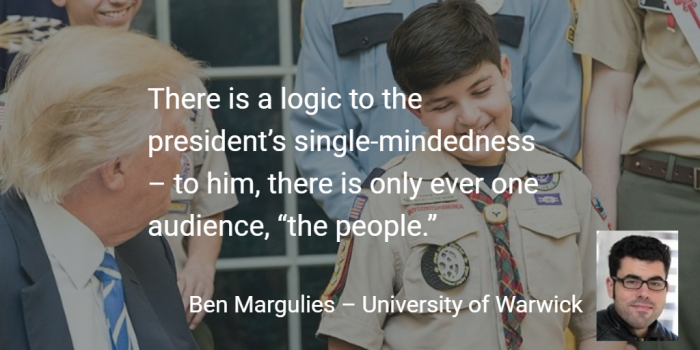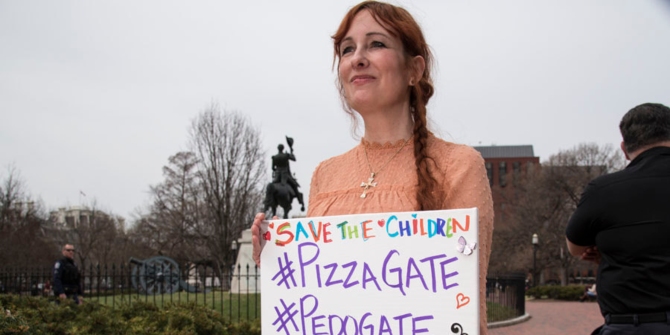 Donald Trump’s speech to the Boy Scout jamboree has been criticised as wildly inappropriate. But to a populist, there might only be one audience – and it might not be the physical people right in front of you. Ben Margulies looks at how the logic of populism may explain Donald Trump’s tendency to return to the same themes in very different settings.
Donald Trump’s speech to the Boy Scout jamboree has been criticised as wildly inappropriate. But to a populist, there might only be one audience – and it might not be the physical people right in front of you. Ben Margulies looks at how the logic of populism may explain Donald Trump’s tendency to return to the same themes in very different settings.
We are all by now familiar with the themes, tenor and style of Donald Trump’s public speaking. We know that he tends to attack various groups that observers might call “elite” – often Congress and the “fake news” media. At the CIA on January 21, he raised the dispute over the number of spectators at his inauguration the day before. At a February press conference, he accused the media of extensive, “out-of-control” dishonesty. In fact, the alleged inaccuracy and untrustworthiness of the press is a common topic for the 45th president. Some speeches include pledges to rein in the federal government and its bureaucrats, a platform encapsulated by the “drain the swamp” slogan, and attacks the Democrats for obstruction. He also frequently references the fact of his election victory, as he did at an April 2017 address to the National Rifle Association.
Trump is known for revisiting the same themes regardless of his audience. He discussed the inauguration crowd dispute at the CIA; he complained of political persecution at the United States Coast Guard Academy. Perhaps the clearest, and yet most jarring, example of Trump’s stubborn focus on his favoured grievances came during his July 24th address to the National Boy Scout Jamboree in West Virginia. This speech, which The Washington Post described as “very much like the rally speeches that Trump gave across the country last year,” included attacks on the media; the aforementioned “swamp” (Trump suggested alternative designations, specifically “cesspool” or “sewer”); President Obama; and West Virginia’s Republican senator. He adhered to form so closely that he mentioned “you and all of the other millions and millions of people that came out and voted for Make America Great Again,” though his audience was mainly composed of people below voting age.
Amid the predictable uproar, one question is left unexamined. Why does Donald Trump stick so firmly to the same themes, regardless of his audience? Some may argue that he is simply narcissistic, or even mentally ill. Perhaps his personality does play some unquantifiable role. But, as with so much else about the 45th president, the answers may lie in the logic of the populist ideology and style through which he views the world.
Let us start with the medium. Right-wing populism, as Wodak notes, depends heavily on the mass media to disseminate its message, since populist parties do not tend to have strong, discipline party institutions or masses of militants. (In the US, this is true of parties in general.) So whenever Trump speaks, regardless of his physical audience, he is in effect speaking to the mass media and wider supporters.
Trump’s mostly unvarying discourse, however, also evokes something of the inherent logic of populism. To a populist, the people are not only united and pure, but homogenous. They are, in their political aspect, all of one opinion and one voice; they constitute, in part or in whole, a single audience. It relies on the “fundamental conception of the people as both homogenous and virtuous.” In repeating the same themes over and over again, Donald Trump is merely acknowledging that populist “truth.” Jan-Werner Müller, in his recent work on populism, quotes the president’s own take on this worldview: “The only important thing is the unification of the people, because the other people don’t mean anything.”

Populists also distrust those institutions that stand between government and the “will of the people,” and the elites who run them. “Populists criticise the intermediary organisations that stand in the way of the true and uncorrupted expression of the will of the people.“ This provides another reason for Trump to ignore the nature of his venue and of his host; the Boy Scouts, however conservative and unthreatening they might be, are just another “intermediary organisation.” Their presence is of secondary importance to the bond that Trump has with his “people.” And their leaders can be damned as out-of-touch elites too: Ben Starnes, a columnist at the conservative website Townhall.com, accused the Boy Scouts of trying to censor pro-Trump sentiments among attendees and of having “long ago turned its back on longstanding values for the sake of appeasing the sex and gender revolutionaries.”
And if Trump creates outrage? Well, outrage is also part of the radical-right playbook; it attracts the attention of the media, which in turn spreads the populist message and raises its profile, while providing an elite opponent for the populist to play off against. Wodak called this the ‘right-wing populist perpetuum mobile‘. For example, Matt Vespa, associate editor at the right-wing website Townhall.com, wrote an article objecting to liberal and media response to the Boy Scouts speech, calling it a “sad, pathetic tantrum of urban-based progressives.”
Superficially, Trump’s willingness to return to the same themes before wildly different groups of spectators and listeners seems to make little sense, if not to mark some basic lack of empathy or recognition. But there is a logic to the president’s single-mindedness – to him, there is only ever one audience, “the people.” Whether they are in the arena before him or on the other end of a broadcasting signal is a less important distinction than you might think.
“President Trump’s First 100 Days: 31” by The White House is licenced under Public Domain Mark 1.0
Please read our comments policy before commenting.
Note: This article gives the views of the author, and not the position of USAPP – American Politics and Policy, nor the London School of Economics.
Shortened URL for this post: http://bit.ly/2vQ24zE
________________________________
 Ben Margulies – University of Warwick
Ben Margulies – University of Warwick
Ben Margulies is a Postdoctoral Fellow at the University of Warwick.






